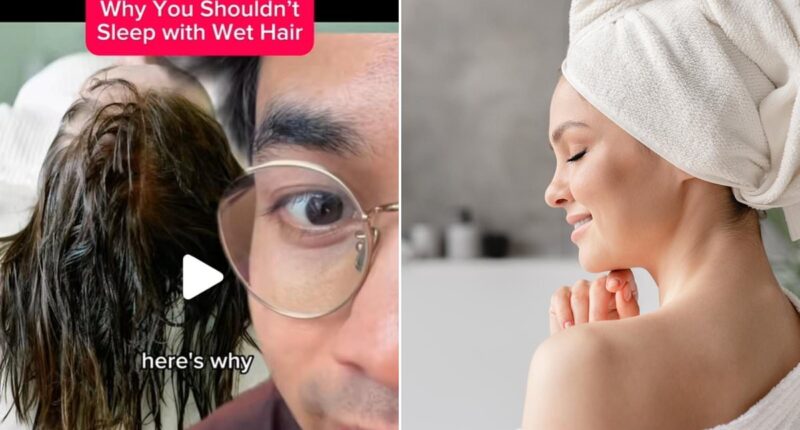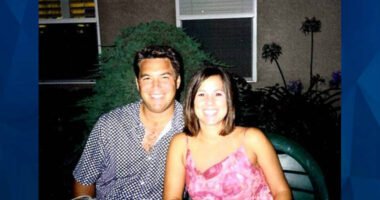If you’re a late-night shower fan (or just too lazy to dry off your hair before bed), you could be putting your hair and health at risk.
In a recent revelation, Dr. Samuel, a Singapore-based GP, emphasized the detrimental effects of going to sleep with wet hair on both your hair and scalp.
Dr. Samuel, who shares medical advice with a substantial following of 537,000 on TikTok, highlighted the importance of ensuring your hair is fully dried before bedtime. A video he uploaded discussing this has garnered over 400,000 views already.
‘When hair is wet, hydrogen bonds break making the hair more elastic, more prone to breakage,’ he said.
‘Furthermore, keeping your hair wet for extended periods can lead to swelling of the strands, increasing the likelihood of breakage when styling or simply resting on wet hair while asleep.’
However, it’s not just hair breakage you need to worry about.
‘What most people may not realise is that sleeping with wet hair creates a very good environment for fungus to grow,’ he warned.
‘While it causes [a] severe itch and your scalp to flake a lot, what people don’t realise is that sometimes this can lead to scarring that can lead to hair loss – hair loss that can be permanent if not treated in time.’

Singapore-based GP Dr Samuel says going to bed with soggy strands could lead to fungal scalp infections, hair loss and hair breakage
Dr Noelle Sherber, a dermatologist, added that bacteria and germs ‘thrive in warm, moist environments,’ meaning as you sleep, these are growing on your head and being transferred to your pillow and bed – causing a host of problems.
She told Allure: ‘Certain bacteria and fungi thrive in warm, moist environments and so will proliferate on scalp skin if it stays damp for hours.
‘Most commonly, a type of yeast called Malassezia can accumulate on the scalp and cause flaking, which can be mistaken for dandruff.’
Malassezia can also cause itchy pimples to form on the face, scalp and upper body.
Before you panic and swear off night-time showers forever, Dr Samuel assures fans that the fix is quite simple.
‘This can be easily preventable through simple measures,’ he said.
‘Use a microfibre cloth, wrap the hair along its length gently twisting it and leaving it up for 10 to 15 minutes to dry.
‘After, you can use your hairdryer on a low-heat setting to fully dry the hair.’

Using a a microfibre cloth on your hair for 10 to 15 minutes after a shower, as well avoiding harsh rubbing is recommended to protect your strands
He also adds that you should never vigorously rub your hair with a towel while it’s wet, something many are guilty of doing, especially in a rush.
And while your elders may have warned you that wet hair in bed would make you sick, Dr Samuel clears up that myth too.
‘The only good news in all of this is that wet hair does not increase your risk of falling sick,’ he adds.
So while you won’t catch a cold, you might just catch an unwanted bald patch or two, and that should be reason enough to rethink your post-shower routine.
‘Never knew that what my elders used to tell me would be true. They also said that I shouldn’t sleep with wet hair because I might go bald ,’ one follower commented.
‘Literally I was about to go to bed with wet hair. Never again!’ another added.

















